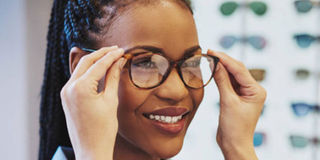Eye care: Reasons for wearing glasses

Eye glasses should only be worn after careful examination and reccomendation from a specialist. STOCK Photo
What you need to know:
Many people live with poor vision because they do not realise they would see better with vision correction. However, as soon as you notice your eyesight is changing, it is time to see your eye doctor.
There are many different types of vision problems that could be affecting your eyesight leading to impaired vision. Most of them can never be corrected even with a change in diet so one will require a pair of glasses.
The problem, however, is that most people do not get the right glasses for their respective eye problems. Some buy glasses from hawkers which is dangerous according to Brian Isiko, an optician at St Francis Nsambya Hospital.
“I strongly discourage people from buying reading glasses from anywhere because these glasses make it more complicated and with time the eyes become more damaged. This is because the pupillary distance is different depending on individuals,” he says.
Christine Atuhaire experienced teary eyes every time she looked at a computer or looked into bright light. She struggled with this problem for close to five years but did not see an eye specialist until her eyes became itchy and started swelling at night.
According to Isiko, if you experience light sensitivity or trouble transitioning from a dark environment to a light environment or vice versa, struggling to see at night, wavy vision, double vision, noticing halos around various objects such as bulbs, car headlights, street lamps, or other light sources, especially when they are in a dark setting, it is likely a sign of an underlying vision problem.
Astigmatism
Most people have some degree of astigmatism, which is usually present at birth and is believed to be hereditary. The condition manifests with an uneven curvature of the cornea or lens, which results in blurred or distorted vision.
Astigmatism symptom can also include the need to squint, eye strain from squinting, headaches and eye fatigue. In minor cases, treatment may not be required but is certainly beneficial. Moderate to severe astigmatism can be treated with corrective eyewear or surgery.
Glare
For Atuhaire, the optician prescribed glasses with antiglare so that she wears them whenever she was using a computer or moving outside in bright light. According to Dr Grace Ssali, a consultant ophthalmologist at Mulago national Referral Hospital, antiglare glasses are recommended for all people that use electronics. This anti-reflective coating improves vision, reduces eye strain.
These benefits are due to the ability of antiglare coating to virtually eliminate reflections from the front and back surfaces of your lenses.
Farsightedness
Dr Ssali says long sightedness is vision that is good at a distance but not at close range.
In such cases, the eyeball is shorter than normal, as measured from front to back, or when the cornea has too little curvature.
“If you are mildly farsighted, your ophthalmologist may not recommend corrective treatment at all. However, if you are moderately or severely hyperopic, you may have several treatment options available, including eyeglasses, contacts or surgery,” she says. Your ophthalmologist will help you determine the best treatment option for you depending on your degree of farsightedness.
Nearsightedness
Nearsightedness, medically known as myopia is when a person’s sight for things that are at a close range is good but worsens at a distance.
Isiko says it generally occurs because the eyeball is too “long” as measured from front to back. Nearsightedness is diagnosed during routine eye exams and possible treatments include eyeglasses, contacts, and acrylic corneal implants.
Their cost also depends on the frame but these can be between Shs150,000 to Shs1m.
Aging eyes
Medically known as presbyopia, aging eyes, is a condition in which the lens of the eye gradually loses its flexibility, making it harder to focus clearly on close objects such as printed words.
Dr Ssali says: “Aging eyes happens in people above 39 years but does not affect sight for things that are at a distance. Regrettably, presbyopia is an inevitable part of aging. It cannot be prevented by diet, lifestyle or visual habits.”
It is, however, treatable with several types of corrective lenses, including progressives, bifocals and trifocals, single-vision reading glasses, multifocal contact lenses. Depending on designers, a pair of reading glasses can cost between Shs80.000 and Shs150,000.
Too much light
There is a lot of sunlight. Moving without protection for your eyes is not ideal. Wearing shades is recommended for everyone who walks out on a very bright day.
Isiko says: “Shades that are bought from hawkers have tinted glass but do not help in any way. Others have lenses which are not needed. It is healthy to get a recommendation from an ophthalmologist after assessment.
A good pair of shades from an eye centre costs Shs50,000.
Caution
If you have a challenge with your sight, it is important that you go for tests which may include looking through a series of lenses and using light to test your vision and responsiveness.
“However, even if you are not experiencing vision problems, it is good to schedule regular visits to your ophthalmologist to help you address any vision impairments, diseases, or issues on the early onset instead of waiting until it has progressed to a level of concern,” says Brian Isiko, an optician at St Francis Nsambya Hospital.
The best treatment for eye strain that is not caused by underlying vision problems is rest, eye drops, limiting your screen time, proper lighting, and ensuring that your indoor space has good air quality.




